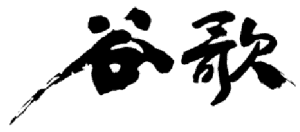Thursday, April 20, 2006
Google Mexico Blog
Google has a new & official Mexican blog. [Via Mr. Weinberg.]
Miro Logo Under Attack

Ooops... Google is running into copyright problems for using the Miro logo today. [Thanks Google’s World.]
GuGe Ad Translated

ChinaSnippets.com translated Google’s recent Flash ad which promoted Google’s mission in China, and its new Chinese name (more at the accompanying blog post).
Animated Ad for Google Local UK
Google already sends animated ads to webmasters using graphic AdSense. It now seems they also advertise their own services using (Flash) animations. Compare that with what Google’s director of technology, Craig Silverstein, said in 2004 and you’ll see a slight change of philosophy:
“The focus that Google has on our users, you know, a very slim homepage and so forth – text ads, not banner . . . We do that because we don’t want to go to sites with banner ads. We don’t like them.”
[Via Digg.]
Google Miro Logo
Google is celebrating artist’s Joan Miró’s birthday today with a special logo. [Thanks Elias Kai, Search-Engines-Web.com, Oreo.]
NYT on Google in China

The New York Times has a long article on Google in China. Clive Thompson writes:
If you log onto a computer in downtown Beijing and try to access a Web site hosted on a server in Chicago . . . [t]he request travels over one of the Chinese pipelines until it hits the routers at the border, where it is then examined. If the request is for a site that is on the government’s blacklist – and there are lots of them – it won’t get through. If the site isn’t blocked wholesale, the routers then examine the words in the requested page’s Internet address for blacklisted terms. If the address contains a word like “falun” or even a coded term like “198964” (which Chinese dissidents use to signify June 4, 1989, the date of the Tiananmen Square massacre), the router will block the signal. Back in the Internet cafe, your browser will display an error message. The filters can be surprisingly sophisticated, allowing certain pages from a site to slip through while blocking others. . . .
Google posed a unique problem for the censors: Because the company had no office at the time inside the country, the Chinese government had no legal authority over it – no ability to demand that Google voluntarily withhold its search results from Chinese users. And the firewall only half-worked in Google’s case: it could block sites that Google pointed to, but in some cases it would let slip through a list of search results that included banned sites. So if you were in Shanghai and you searched for “human rights in China” on google.com, you would get a list of search results that included Human Rights in China . . . whose Web site is banned by the Chinese government. But if you tried to follow the link to hrichina.org, you would get nothing but an error message; the firewall would block the page. You could see that the banned sites existed, in other words, but you couldn’t reach them. Government officials didn’t like this situation . . . but Google was popular enough that they were reluctant to block it entirely.
And:
By having each private company assume responsibility for its corner of the Internet, the government effectively outsources the otherwise unmanageable task of monitoring the billions of e-mail messages, news stories and chat postings that circulate every day in China. The government’s preferred method seems to be to leave the companies guessing, then to call up occasionally with angry demands that a Web page be taken down in 24 hours.
Later in the article, Chinese pro-democracy activist Zhao Jing – whose blog had been shut down by Microsoft – ranks the different IT companies in order of ethics. For him, Google comes out on top, having made a perhaps necessary compromise. Microsoft follows, and Yahoo is last. According to Zhao, “Yahoo is a sellout. Chinese people hate Yahoo.” Zhao said at least Google never put anyone into jail; Google committed the sin of omission, rather than commission. While I agree with Zhao’s ranking, I wonder if we get the same results if we order by hypocrisy of Google management (considering the informal corporate motto they claim to follow... because even the most optimistic interpretation of what they do in China is “a little evil for a greater good”).
[Via Valleywag.]
Yahoo Helping to Jail 3rd Writer?

Yahoo is now accused of having helped the Chinese gov’t to jail yet another dissident, Jiang Lijun. He’s been sentenced to four years (and from what we’ve heard, jailed dissidents have a very hard time in jail and may even lose their mental sanity). In other news, Skype has admitted that its partner in China is censoring text messages. [Via Valleywag, Support Freedom.]
>> More posts
Advertisement
This site unofficially covers Google™ and more with some rights reserved. Join our forum!
